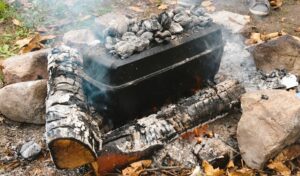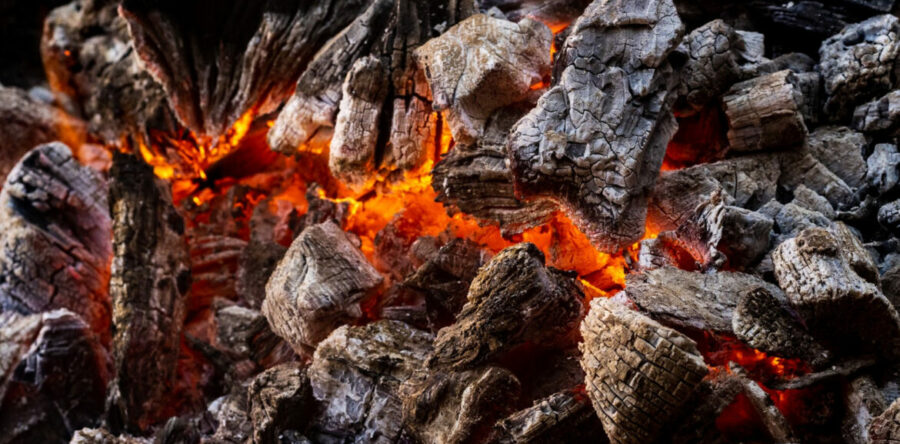Everything you ever wanted to know about charcoal BBQing but were afraid to ask… Part #1
It seems a burning question on the interweb is all about charcoal BBQing, not about grills, accessories, recipes, etc. but about the charcoal itself. We are glad to edumacate you to make you learn stuff.
But first, a tiny bit of history (not super boring):
When gas grills started to gain popularity in the ’70s, charcoal grills began their slow fade into oblivion. Eventually, it became ‘uncool’ to cook with charcoal briquette on a portable hibachi!
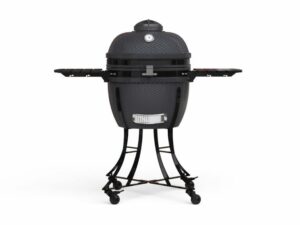
Fast forward to the 1990s, and charcoal BBQing began its renaissance. Due to some were longing for the taste of their childhood. Then, the ‘Foodie’ culture began in earnest (not Ernest – he was sad excuse of a cook anyway) and they were looking for new food ‘experiences’. Around the same time, new cooking appliances such as the Kamado style BBQ (like our Ambiance Modell XX – Kamado 25 – Ambiance (ambiancefireplaces.com), improvements on the tried-and-true kettle-style, the barrel style, portable and outdoor kitchen built-in, and more, began to enter the market.
Finally, (that blessed word!) charcoal itself began to evolve, with consumers facing a myriad of choices of briquettes (some self-lighting) and lump charcoal from various hardwood species.
Without further ado, let’s plunge into this hot topic.
IS CHARCOAL BBQING BETTER THAN GAS?
Yes and no…
Oh, you want more? Please read through the following pros and cons of each appliance. And before your twitching fingers can start texting me a devastating counterargument for each of those, please read to the conclusion. And feel free to provide us with more Pros and Cons if we missed any.
GAS PROS:
Convenience – Easy to light and control
Gas fuel might be cheaper than charcoal over the long run
Excels at high-temperature cooking (searing steaks, for example)
Easier to control the temperature
Typically, better for cooking for large crowds
CHARCOAL PROS:
Provides a nice smoky flavor
Versatility – Can cook a steak at high-temps or slow smoke
Can heat up faster than gas grills
Ashes can be used in your garden to provide needed minerals
Depending on options can be more affordable
Also more affordable to maintain
GAS CONS:
Requires parts replacement (igniter, burner, etc.)
Doesn’t really impart flavor
Does not perform well if wanting to smoke meat
Typically not portable
CHARCOAL CONS:
Lengthy fire startup procedure
Charcoal can burn unevenly
Temperature control can be difficult
It can be messier and more difficult to clean
Conclusion: For each of the cons above, there are solutions. Either a change in procedure or accessories would make these points invalid.
But… if we had to distill it to one thing: Charcoal provides better taste and smoky flavor. On the other hand, if you are looking for convenience (ease of adjustment, cleaning, etc.), gas is likely to be your choice.
WHY DOES CHARCOAL BBQ TASTE BETTER?
This is one thing gas grills can’t come close : Wood smoke flavor.
Why is charcoal better? Let’s dispel some myths first. If you cook on high heat on a charcoal BBQ, it is very unlikely you are getting all the benefits of wood smoke taste in your food. The reason for this is high heat coming from the charcoal is burning most of the volatile compounds (wood smoke). So, unless you add some wood chips, most of the flavor will be imparted by meat drippings being vaporized on the hot coals. Which is not a bad thing either.
However, the primary reason people use a charcoal BBQ is the ability to cook ‘Low n Slow’. Ribs, Beer Can Chicken, Smoked Salmon, Turkey, etc., the sky is the limit if you want to impart that wonderful smoky flavor.
Lower cooking temperatures allows your lump charcoal wood smoke to really shine through. You can also add some hardwood chips or chunks to add additional smoke.
Wanna know how to do it? Please click on the following link to our ‘Low n Slow’ cooking articles series.
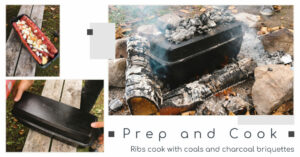
HOW IS BBQ CHARCOAL MADE?
Most people use either lump or charcoal briquettes, so we’ll focus on the process for each as it is very different.
Lump Charcoal: Is typically made from leftover from sawmills, furniture manufacturers and others. It is then put into a large container, heated up to combustion temperatures, but since oxygen is restricted, it does not ignite. However, all the water and some volatile compound is extracted. This process can take a day or more. An interesting note: if you ever bought a bottle of ‘liquid smoke’, this is basically leftover from this process. Water vapor infused with wood smoke.
Charcoal Briquette: The same mill who processed lump charcoal is left with small pieces and charcoal dust that cannot be re-sold as is. They mix this dust with binders such as starch then compress it into briquettes and baked to harden them up. Other manufacturers use sawdust from mixed wood from lumber mills. Once this sawdust is turned into charcoal it is mixed with various additives. This is then molded into their pillow shape.
Since briquette manufacturers do not provide a list of ‘ingredients’ of the binders used, some people are concerned about additives. Some brands have responded by offering ‘Natural Hardwood Briquette” which contains no binders.
If you want to see an interesting video about the whole process, click on this YouTube video.
IS CHARCOAL BBQING ALLOWED IN PARKS OR PUBLIC SPACES?
This is a highly recurring question on the Internet. For obvious reasons, you should check the answer with your local by-laws.
Besides checking with your local authorities, common sense and safety should be foremost when handling combustible material in public.
The National Fire Protection Association (NFPA) has provided a valuable checklist to this effect: Grilling_safety_Tips.pdf (nfpa.org)
Finally, neighborliness should prevail if you are close to a crowd to ensure they don’t mind. Also, please be aware if younger children and others with respiratory diseases may be nearby. In such case, you may need to reduce the amount of smoke your grill produces.
WHICH TYPE OF CHARCOAL IS BEST FOR BBQ?
Boy, this is a controversial question among BBQ aficionados. But looking at what the experts and pitmasters say, it doesn’t seem to matter that much. Both lump charcoal and briquettes have their pros and cons as you can see below. After which we will discuss if a specific ‘brand’ makes a difference.
LUMP PROS
Less processed – more ‘natural.’
No binders mean fewer ashes than briquette
Puts out more smoke than briquette
Has an unlimited shelf-life
BRIQUETTE PROS
Consistent – From bag to bag, the same amount of BTU
Longer and steadier burn
Environmentally friendly – made from recycled material
LUMP CONS
The manufacturer may not list the species or provenance of their raw material
Foreign material could have crept in (Rocks, plastic, etc.)
Maybe more expensive than briquettes
It Burns faster than briquettes
BRIQUETTE CONS
If not a 100% Natural brand, will contain fillers
Produce more ash than Lump charcoal
Takes longer to light
Most manufacturers do not list what fillers are added
Self-igniting match-light charcoal contains mineral spirit which can taint the food
Need to be fully ignited to reduce off-taste
Has a limited shelf-life
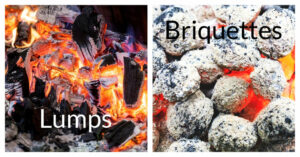
Briquette VS LumpsWhile you might reasonably conclude the purest and most professional pitmasters would always gravitate to lump charcoal, that is not always the case. Many pitmasters prefer briquettes for its consistency and long and steady burn. Since it has a more significant impact on the overall flavor than the ‘type’ of charcoal; Pitmasters would rather spend their cooking efforts on food quality, ingredients, and others instead.
The original question was, “What type of charcoal is best for BBQ’ing?”. This could imply, “Which brand is best?”. I am aware of only 2 sites that have done a comparative study on this, and their links are below.
This one by WireCutter The Best Charcoal for Grilling | Reviews by Wirecutter (nytimes.com) should be taken with a grain of salt. The title explains why. If you are ‘grilling’ (cooking at high temperature) versus BBQ’ing (cooking ‘Low n Slow’), this article may be helpful. Charcoal is rated on how hot it gets, how long it lasts, and how little ash it produces.
However, one of the worst charcoal I used was also one of the best for ‘Low n Slow’ cooking. It was darn near impossible to light and left an excessive amount of ashes. But, it burned slow and steady without runaway heat or having to refill multiple times for BBQ ribs. So, it depends on what you are trying to achieve.
The following link, The Lump Charcoal Database — Naked Whiz Charcoal Ceramic Cooking, actually goes through testing and rating various brands of charcoal. Which I find amazing. The only problem with this approach is, can a charcoal manufacturer really control its raw material from one batch to another or year to year? So again, test yourself and go with what works for you.
CAN BBQ CHARCOAL GO BAD?
Lump charcoal can last just about forever as long as you keep it dry.
Briquette is another story. It is made of binder such as starch and absorbs moisture much easier than lump charcoal. Self-igniting charcoal has a year or two shelf life before the igniting chemicals evaporate.
What should you do if your charcoal goes damp? For either lump or briquette, you can lay them out in the sun for a day. But if the briquettes easily crumble, you may as well get a new bag.
CAN I USE BBQ CHARCOAL ON MY GAS GRILL?
You shouldn’t, but you can.
Firstly, here is why you shouldn’t. Your grill will fill quickly with ashes. This may clog the nozzles of your burners. And, if you are like me and not prone to clean your BBQ after every use, the ashes can absorb moisture or, worse, get wet. This acidic mush will start eroding the bottom of your grill. This ain’t bad if you were trying to convince your spouse you needed a new grill anyway.
But if you have an old grill and the burners no longer work, you can certainly remove all the old components and refit your grill into a BBQ. Not ideal, but there are YouTube videos about this.
Why not head over to your WE LOVE FIRE local dealer instead? I am sure they have a charcoal BBQ that fits your budget. And, what’s best, they carry the latest in ‘hybrid’ BBQ, meaning it can burn both gas and charcoal. Or some gas models come standard with a charcoal and smoker tray.
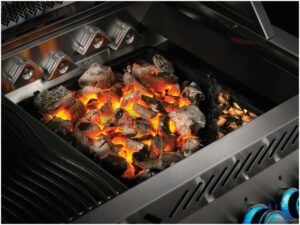
IS BBQ CHARCOAL ACTIVATED ?
Surprisingly, this is an often-asked strange question. Those asking are really wondering if BBQ charcoal can be used for water purification or medicine.
Charcoal manufacturers activate it by use of steam or hot air to erode its internal surface, which increases the outside surface area and its adsorption rate—the capacity to bind materials to a surface. Because of those adsorption abilities, charcoal has earned a reputation as a kind of bodily super-cleanser.
The medicinal use of activated charcoal is very specific, and no one should be eating the stuff by the spoonful. Or, you may have to do a quick dash to the ‘John’ (or so a ‘friend’ told me).
While there is no evidence of people dying from eating BBQ charcoal, we certainly do not recommend doing so. If you have health concerns, better consult with your health practitioner.
CAN I USE BBQ CHARCOAL TO FILTER WATER / AIR?
Charcoal specific to filtration purposes is called Air, Water, or Vapor phase carbon. They are manufactured in a precise manner to achieve the desired application.
Charcoal made for water purification is ‘activated’.
But in a pinch, you can use BBQ lump charcoal (not briquettes as they may have binders and chemicals). And here is how you can do it.
How to make an Improvised Charcoal Water Filter:
Use charcoal from a reputable source
Crush your charcoal into small bits, from powder up to the size of aquarium gravel.
Use a tall cylindrical container (taller is better than wider) and punch some small holes at the bottom.
You can pour water at the top, and the purified water will come out the bottom. Don’t make the holes too big, you want the water to spend as much time as possible with the charcoal to filter the water.
IN THE 2ND CHARCOAL ARTICLE WE WILL COVER THE FOLLOWING TOPICS:
How to:
What Is The Best Method To Light Charcoal?
How Long Before The BBQ Coals Are Ready?
Health Related
Is Charcoal BBQ Good Or Bad For You?
Gardening:
Is BBQ Charcoal Good For Orchids And Other Plants?
Can I Use BBQ Charcoal Ashes In The Garden?
Buying Advice
